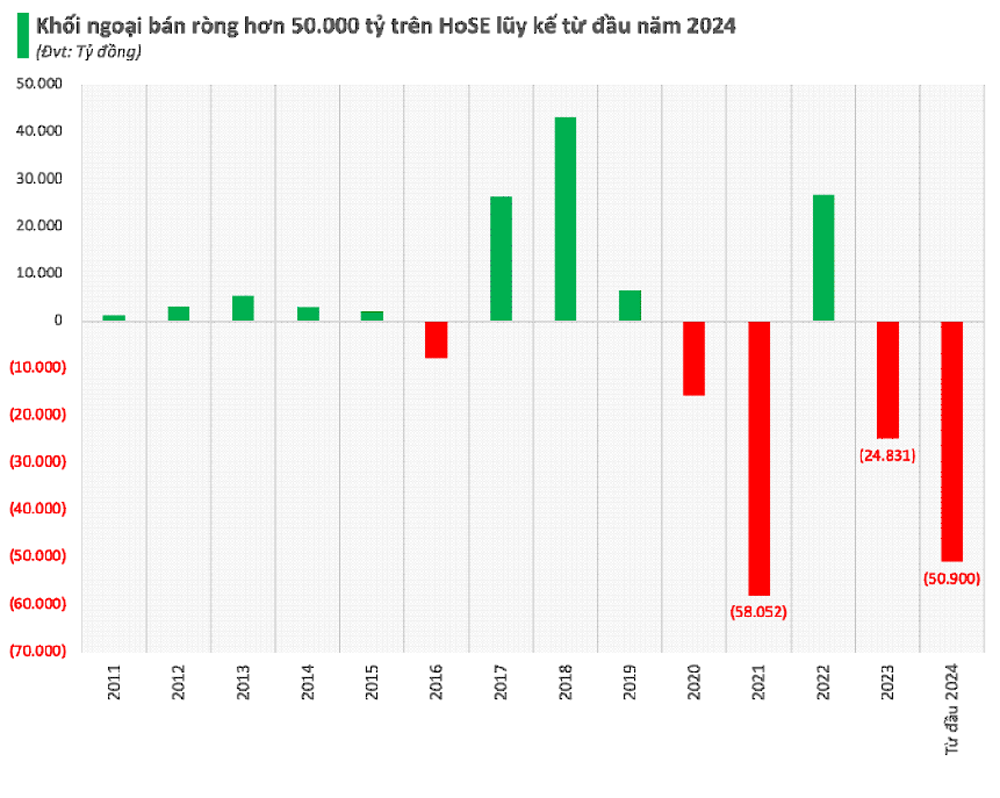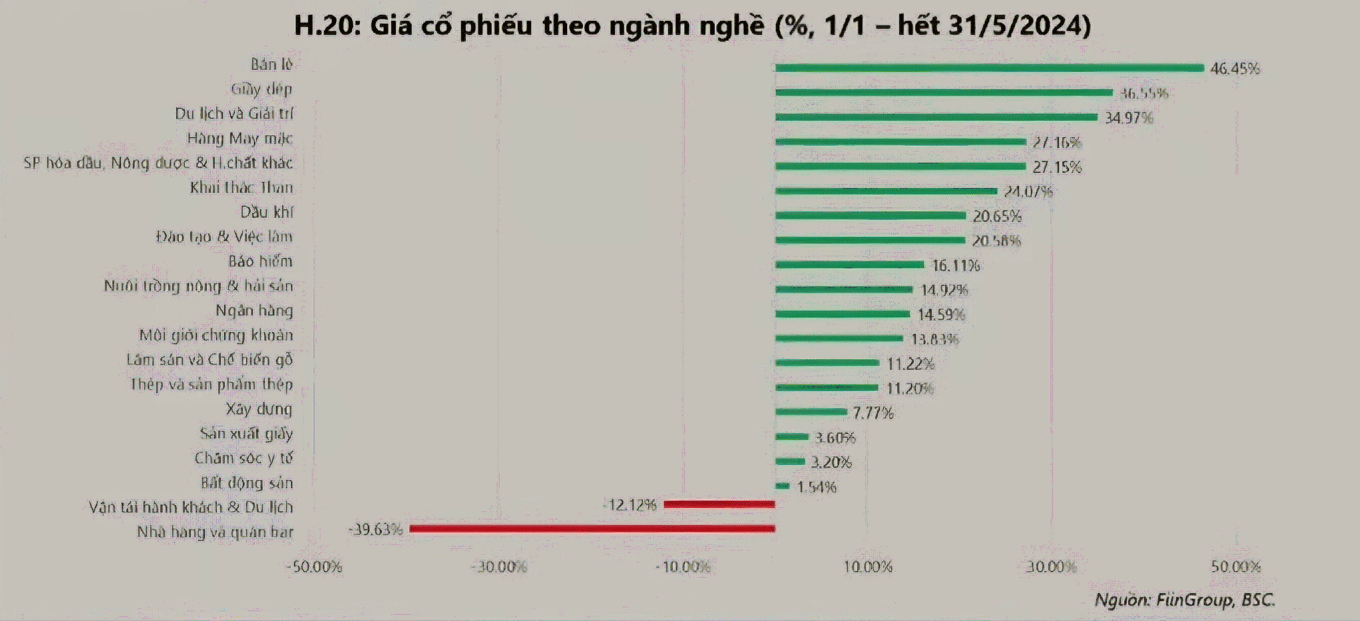Vietnam's economy unexpectedly recorded very positive results in the second quarter, dispelling many concerns of investors. How optimistic will the stock market be in July and the second half of 2024?
Economic breakthrough
The General Statistics Office of Vietnam has just released a record macroeconomic report for the first 6 months of 2024, with strong growth in the second quarter. GDP in the second quarter increased by 6.93%, surpassing the forecasts of most major organizations and being the highest growth in the second quarter in the past 13 years, except for the special period of 2022 (increased by 7.99%).
This is a surprising figure because some international organizations have predicted that economic growth in the second quarter may be lower than in the first quarter (5.66%).
Average growth in the first 6 months of 2024 reached 6.42%, far exceeding the expectations of organizations such as the World Bank (WB) or the International Monetary Fund (IMF). These organizations forecast 5.5-6% for the whole year of 2024.
A series of records were set. Exports in the first 6 months reached more than 190 billion USD, up 14.5% over the same period last year, surpassing the record of 185 billion USD set in the first half of 2022.
Disbursement of foreign direct investment (FDI) reached a new historical record of 10.84 billion USD, up 8.2% over the same period last year.
Also in the first 6 months of 2024, Vietnam recorded a budget surplus for the first time in history, with total revenue reaching 1.02 million billion VND, up 15.7% over the same period, while total budget expenditure reached more than 803 trillion VND.
International arrivals in the first 6 months increased by 58.4% to a record high of 8.8 million, 4.1% higher than the pre-pandemic record - half of 2019...
Stock market first half of the year bumpy
In the first half of 2024, stock investors experienced mixed emotions. This situation also occurred in June. In the first half of June, investors expected the VN-Index to break through the 1,300-point threshold. But in the second half of the month, there was a feeling of anxiety when the VN-Index had sharp declines, breaking the index's short-term growth.
Most stocks fell 5-15% after the end of June. The VN-Index closed at 1,245 points, down 1.3% compared to May.
Sharing his assessment of the Vietnamese stock market, Mr. Nguyen Minh Giang, client asset management expert, KBSV Vietnam Securities Company, said that there were many factors affecting domestic and foreign macro as well as events on the stock market that broke the short-term upward trend of the VN-Index in the second half of June. These factors are: In June, ETFs restructured and fixed monthly/quarterly NAV; foreign investors increased net selling pressure; domestic exchange rate pressure; DXY index increased again, the gold market was unpredictable...

The depreciation of VND and the strengthening of USD are the main reasons for foreign investors' continuous net selling on the stock market. As of June 2024, foreign investors have net sold more than 50,000 billion VND, equivalent to about 2 billion USD. This net selling level is the highest since 2011 (if counting the first half of the year).
Although the proportion of foreign trading in the Vietnamese stock market is not as large as in previous years (estimated at 19%), it must be admitted that the continuous net selling and concentration on large-cap stocks have put some pressure on the market and affected the trading psychology of individual investors. However, the pressure from foreign investors will gradually cool down from the third quarter onwards when the exchange rate pressure is no longer too tense.

Expecting a boom in the Vietnamese stock market in the second half of the year
With positive economic signals, how will the stock market perform in the second half of the year?
Reality has shown that the stock market is not the economy but a synthesis of expectations about listed companies' profits (partly influenced by the macro economy), the level of cheap money in the economy, the flow of money between investment channels such as real estate, cryptocurrencies, gold, USD... Besides, there is foreign capital flow...
According to Mr. Giang, there are many reasons to expect that the Vietnamese stock market will improve in the second half of the year, following the “better” picture of the economy. First of all, there is the possibility that exchange rate pressure will cool down in the second half of the year.
According to recently released data, the US core personal consumption expenditures price index (core PCE), the Fed's preferred inflation measure, recorded its weakest increase in more than 3 years in May 2024. This will strengthen the possibility that the Fed will cut interest rates for the first time in the second half of the year (expected to take place in September). Many major central banks have cut interest rates such as Canada, Sweden, Switzerland...
Domestically, the State Bank continues to use flexible management tools to reduce exchange rate pressure such as issuing 14-day treasury bills to push interest rates up to 4.3%, and for commercial banks in need of capital support, the State Bank lends via the OMO channel at an interest rate of 4.5%. This is considered a move to establish a higher interbank interest rate level, thereby reducing pressure on exchange rates and foreign exchange reserves.
Businesses' demand for foreign currency in the second half of the year is expected to gradually cool down because most orders were prepared in the first two quarters of the year.
The gold market has been stabilized and well controlled by the State Bank after applying the sale of SJC gold bars through 4 state-owned commercial banks (Agribank, Vietcombank, BIDV, Viettinbank) and SJC Company, which has helped reduce the difference in domestic SJC gold bar price compared to the world price from an average of 15-17 million VND/tael to only 4-5 million VND/tael, reducing smuggling and gold speculation, thereby avoiding foreign currency loss.
In addition, positive signals such as trade surplus, FDI capital and remittances still maintaining good growth over the years are also the basis for expecting exchange rate pressure to gradually cool down in the second half of the year.
On the stock market, in July, listed companies will announce their second quarter business results and semi-annual financial reports. This is a very important period, especially in the context of the market having a short-term adjustment.
The VN-Index is expected to spend 2-3 weeks sideways in the range of 1,235-1,285 points, creating momentum to surpass the expected 1,300 points in the second half of July and conquer the target of 1,380-1,400 points by the end of 2024.
Notably, the National Assembly officially passed important laws, including the amended Land Law, the amended Housing Law, and the amended Real Estate Business Law, which will take effect from August 1, 2024, five months earlier than expected.
Real estate businesses are facing many difficulties in terms of legal factors. When the above 3 laws are officially passed, it will help to solve the problems for real estate businesses and also partly boost credit growth in the last months of 2024.
On the stock market, real estate stocks recorded the lowest increase, most real estate stocks have been and are forming a mid-term bottom. In addition, export, retail, shipping, energy, finance groups, etc. may continue to increase in price.
VN (according to Vietnamnet)